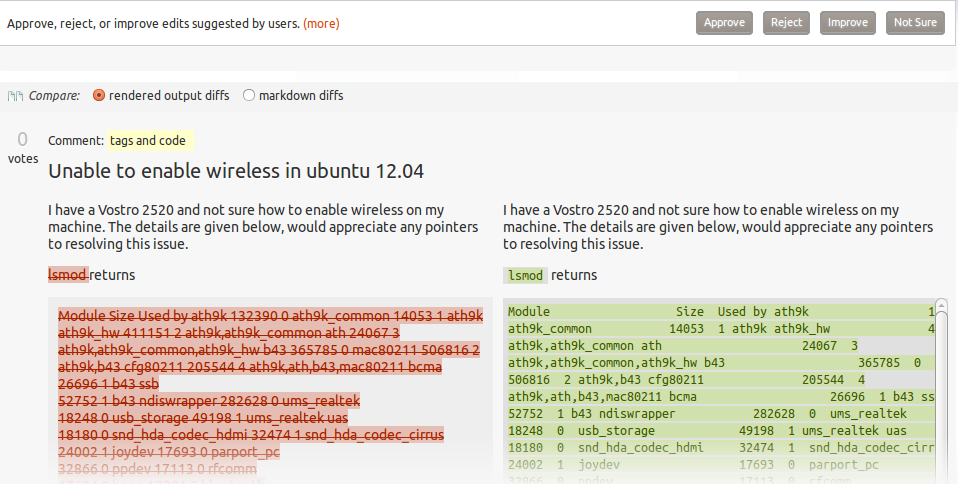What is peer review? I always see this quote on a statement after edit a post. And how much reputation user can do the peer review?
This is the example:
Thanks for your edit!
This edit will be visible only to you until it is peer reviewed.
Peer review means someone else must review and approve your edit, before it is applied.
On at least one other Stack Exchange site (Stack Overflow), more than one person must review it before it is definitively accepted or rejected. But on most Stack Exchange sites, including Ask Ubuntu, the peer review process need only involve one person reviewing your edit. (Unless two people end up reviewing it at almost the same time, and both approving, or both rejecting it. In that situation, the editing history will show both reviewers' actions.)
The reviewer has (as I count them) five options, upon seeing your edit:

First, it's helpful to know what kinds of posts can be edited. Actually, almost everything can be edited, but some things (like comments) can only be edited by their authors and by moderators. Some other things can only ever be edited by moderators (like the FAQ). The following kinds of posts, however, can be edited by members of the community:
Low reputation users can suggest edits to any of these posts. Even anonymous users (without accounts) can edit questions an answer. But please note:
Those suggested edits are then subject to peer review.
If you edit a post you don't have enough reputation to edit, you're actually suggesting an edit, and then that suggested edit will be peer reviewed.
It depends on the kind of edit.
For questions and answers, the original author is notified of any suggested edits, and can review them. There is no amount of reputation below which original authors lack this ability.
Here's the broad picture and qualitative explanation of how this works:
Anyone who has edit privileges to edit a post (i.e., who can edit without their edit being subject to review) can also review suggested edits made to the post.
Users with sufficient reputation may visit the review queue for suggested edits (which is one of the categories of review). However, this requires more reputation than is needed to review an edit that one comes upon by browsing. That is, it takes more reputation to be automatically presented with a series of edits to review, than it does to be able to review an edit suggestion that you happen to find.
The amount of reputation to approve a tag wiki edit is considerably lower than the amount of reputation to edit a tag wiki without your edit being subject to review. That is, many (in fact, most) tag wiki edit suggestions are reviewed by users whose own tag wiki edit suggestions would have to be reviewed.
Such a reviewer is limited, however, in that they may only skip over, approve, or reject the edit. They cannot choose to improve it and consider it helpful or improve it and consider it unhelpful. This is because they cannot directly apply any changes to the tag wiki--their own edits are subject to peer review.
Here are the reputation milestones at which each level of posting, editing, and reviewing ability is conferred:
A reviewer's job is to determine if the suggested edit is suitable. To a degree, this is a subjective judgment call. But typically, edits consistent with these purposes and guidelines should be approved, and those that aren't should be rejected. An edit may also be rejected for being too minor (either in that it doesn't clearly improve the post, or in that it is insufficiently significant to be worth the minimal effort of reviewing).
The peer review process on Ask Ubuntu does serve to keep out spam edits. That is part of its purpose. But that is not its primary purpose--most rejected edits aren't spam. Rather, most rejected edits are attempts to reply to the post by editing it, fail to preserve the original intent of the post (which is important for questions and answers, especially those that are not community wiki) or fall outside its scope, or are otherwise wrong.
If you suggest an edit and it is rejected, that does not typically reflect negatively on you. If you feel that your edit should've been accepted, you could post on meta to consult others about the matter. But you should not feel that anything has gone wrong.
Edits that create tag wikis for newly created tags are occasionally rejected if the reviewer believes the tag itself should not exist (since, if a tag is going to be removed, it probably should not have a tag wiki, which would become orphaned when the removed tag disappears from the system).
Tag wikis reflect the the community as a whole (though don't necessarily express community consensus). For each tag, there is only one tag wiki (though it has two parts: the tag wiki excerpt, and the full tag wiki). To decrease the likelihood of edits to tag wikis (and the creation of tag wikis) that hardly anyone agrees with, there has to be either
who think it's a good idea.
Editing a tag wiki without being subject to peer review is the exception rather than the rule. The normal way for tag wikis to be created or edited is that one user submits the suggestion, and another approves it.
Peer review is simply an anti-spam(?) measure to make sure edits to others' posts are valid. If yu look at review, there is a Suggested Edits area. It requires 2000 reputation. At 2000 reputation, you may edit any post(not tag wikis, but CW posts can be done with any amount of rep) and review others' suggested edits. You can reject, approve, or improve upon the edit.